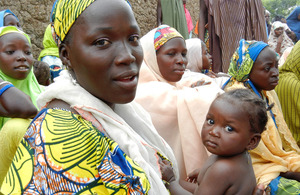Girls and women are vital to progress in Nigeria
Lynne Featherstone launches a new programme to improve the prospects of girls and women in Nigeria

A woman attends a health education session in northern Nigeria. Picture: Susan Elden/DFID
High rates of maternal mortality and violence against women make Nigeria one of the toughest places in the world to be born a girl, Lynne Featherstone said in Abuja today.
The International Development minister made the comments after announcing a new £39 million UK programme which will work with over 120,000 girls as well as local and religious leaders to shift attitudes towards women in the country.
Despite Nigeria’s rapid economic growth, life for women in the country remains tough. The country has 10% of the world’s maternal mortality deaths and over 80% of women in north Nigeria cannot read. A survey of 15-24 year old women found that the majority think it is reasonable for husbands to beat their wives if they burn food, refuse sex or go out without his permission.
Lynne Featherstone said:
Shocking rates of inequality, maternal mortality and violence against women make Nigeria one of the toughest places in the world to be born a girl. Women and girls are being shut out from the country’s impressive economic growth.
What is good for girls and women is good for society as a whole. The government of Nigeria is making good progress on improving the opportunities for women in the country, yet the scale of the challenge remains huge.
That is why the UK will help women and girls across the country to come together and find a united voice, improving access to health, education and jobs.
The 5 year Voices for Change programme will:
-
support 120,000 girls across the country to improve their life skills – financial literacy, health education, negotiation skills and awareness of their rights
-
work with men and boys as well as traditional and religious leaders to shift attitudes and behaviours towards women
-
strengthen legal frameworks and increase national budget resources for women and girls
This is in addition to the UK’s existing work with women and girls in Nigeria, which includes:
-
helping 4.1 million more women get access to finance through the Enhancing Financial Innovation and Access programme
-
getting 600,000 more girls through secondary school
-
improving care for 600,000 mothers through family planning, antenatal care and skilled birth attendance
A quarter of sub-Saharan Africa’s poor live in Nigeria, which is home to 102 million people living in poverty and one of the highest rates of child malnutrition in the world.
While in Abuja, Lynne Featherstone also announced a major Child Development Grant Programme. This will support 60,000 mothers to improve the nutrition of young children to prevent stunting in Jigawa and Zamfara states. Final details of these programmes are being agreed with the Nigerian National Planning Commission.